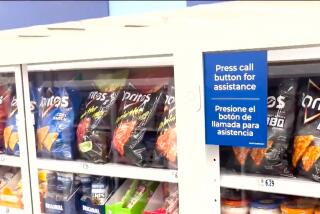Crackdown Irritates Rosecrans Merchants : Safety: Compton targets hazards such as high fences, razor wire and storage areas.
The Monday morning blues were a little worse this week for dozens of businesses along Rosecrans Avenue.
Compton city crews descended on a nine-block stretch of the avenue at 5 a.m. to tear down wrought-iron fences, chop down razor wire, clean up outside storage areas and correct other violations of city safety codes.
City officials described the sweep as emergency action, taken in the interest of public safety.
“The fact is, all these high fences and outdoor storage constituted a hazard where emergency personnel couldn’t get through,” said Paul H. Richards II, assistant city manager. “We had to do something.”
Rosecrans Avenue, one of the most heavily traveled corridors in town, is known for its proliferation of small food stands, markets, auto repair yards and other mom-and-pop stores.
Officials said many of those businesses used fenced-in areas as outdoor storage, allowed trash to accumulate or failed to keep their properties in good repair. Some businesses also have erected fortified fences that exceed the city’s 6-foot height limit. Free-standing signs and banners also violate city ordinances. Officials said city workers went door-to-door last Thursday to warn businesses of the massive effort to correct violations.
Some business owners in the area called it a racist move by the city’s black leaders against the area’s businesses, most of which are run by Latinos.
“This is a kind of harassment, I really believe that,” said Pedro Pallan, who owns a bakery on Rosecrans and is president of the new Latinos United Coalition of Compton. “Why are they picking on this area? Why not target a predominantly black area?”
Pallan was cited for improperly storing material outside the bakery and for installing strands of razor wire to protect his roof from vandals. He cleaned up the storage area before Monday. City workers removed the razor wire during the sweep.
Richards called the racism charges outrageous. “This is a multicultural district. We have all kinds of businesses here.”
The majority of storefronts bear Spanish-language names or markers, but business owners of several races operate along Rosecrans, officials said. Of the two carwash businesses that lost their fences in the Monday sweep, one has a black owner and the other a Latino owner.
Officials said they started with the commercial stretch on Rosecrans between Wilmington Avenue and Alameda Street because it has some of the worst eyesores.
“We had to start somewhere,” Richards said. Similar crackdowns are likely on commercial stretches along Compton and Long Beach boulevards, he said.
City officials say they have been frustrated because businesses and residents have not taken cleanup ordinances seriously.
“This area was just long overdue,” said Councilman Ronald J. Green, whose 1st District includes the Rosecrans stretch. “Everyone has known this was going to happen for a long time. At some point, they need to learn to take us seriously.”
Citizens complain that the city looks like a war zone, but those same citizens violate city codes by putting up fences over 6 feet high and topping them with razor wire, city officials say.
On the city’s major boulevards, a few developers have erected mini-malls with carefully tended landscaping and private security guards of the type common in many cities. But on most streets, businesses of all different shapes, sizes and colors are crammed into commercial areas.
In an effort to create more uniformity, the City Council passed an ordinance last year that requires businesses along major thoroughfares to use certain paint colors and facade styles.
The city provides special grants and loans to help finance the changes, but few businesses have applied, city officials pointed out. Some Latino business owners complained, however, that they were told only of the loans.
City crews also began applying beige paint this week to Rosecrans businesses that had featured such colors as green, blue and purple. The businesses were the first to be targeted for compliance with the ordinance requiring conformity, but code violations had to be cleared up as well, Richards said.
“Our problems went far deeper than just aesthetics,” Richards said. “We had so many violations, it created an emergency that we needed to clean up.”
All items taken from Rosecrans businesses were tagged and are being stored in the city yard.
More to Read
Sign up for Essential California
The most important California stories and recommendations in your inbox every morning.
You may occasionally receive promotional content from the Los Angeles Times.









